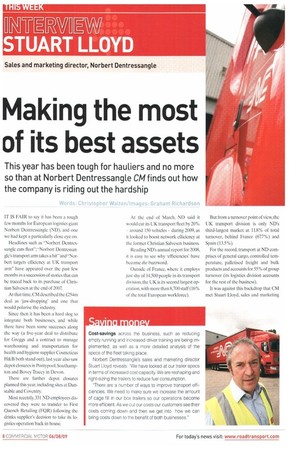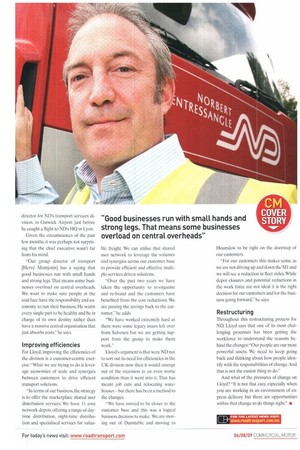Making the most of its best assets
Page 18

Page 19

If you've noticed an error in this article please click here to report it so we can fix it.
This year has been tough for hauliers and no more so than at Norbert Dentressangle CM finds out how the company is riding out the hardship
Words: Christopher Walton/images: Graham Richardso.-
IT IS FAIR to say it has been a rough few months for European logistics giant Norbert Dentressangle (ND), and one we had kept a particularly close eye on.
Headlines such as "Norbert Dentressangle cuts fleet"; "Norbert Dentressangle's transport arm takes a hit" a nd"Norbert targets efficiency at UK transport arm" have appeared over the past few months in a succession of stories that can be traced back to its purchase of Christian Salvesen at the end of 2007 At that time, CM described the £254m deal as 'jaw-dropping' and one that would polarise the industry.
Since then it has been a hard slog to integrate both businesses, and while there have been some successes along the way (a five-year deal to distribute for Greggs and a contract to manage warehousing and transportation for health and hygiene supplier Cosmeticus H&B both stand out), last year also saw depot closures in Pontypool. Southampton and Bovey Tracey in Devon.
There are further depot closures planned this year, including sites at Dunstable and Coventry.
Most recently, 331 ND employees discovered they were to transfer to First Quench Retailing (FOR) following the drinks supplier's decision to take its logistics operation back in-house. At the end of March, ND said it would cut its UK transport fleet by 20% — around 150 vehicles — during 2009, as it looked to boost network efficiency at the former Christian Salvesen business.
Reading ND's annual report for 2008, it is easy to see why 'efficiencies' have become the buzzword.
Outside of France, where it employs just shy of 14,500 people in its transport division, the UK is its second largest operation, with more than 8,700 staff (16% of the total European workforce). But from a turnover point of view, the UK transport division is only ND's third-largest market at 11.8% of total turnover, behind France (67.7%) and Spain (13.5%).
For the record, transport at ND comprises of general cargo, controlled temperature, palletised freight and bulk products and accounts for 55% of group turnover (its logistics division accounts for the rest of the business).
It was against this backdrop that CM met Stuart Lloyd, sales and marketing director for ND's transport services division, in Gatwick Airport just before he caught a flight to ND's HQ in Lyon.
Given the circumstances of the past few months, it was perhaps not surprising that the chief executive wasn't far from his mind.
"Our group director of transport [Herve Montjotin] has a saying that good businesses run with small hands and strong legs. That means some businesses overload on central overheads. We want to make sure people at the coal face have the responsibility and autonomy to run their business He wants every single part to be healthy and be in charge of its own destiny rather than have a massive central organisation that just absorbs costs," he says.
Improving efficiencies
For Lloyd, improving the efficiencies of the division is a customer-centric exercise: "What we are trying to do is leverage economies of scale and synergies between customers to drive efficient transport solutions.
terms of our business, the strategy is to offer the marketplace shared user distribution services. We have 11 core network depots offering a range of daytime distribution, night-time distribution and specialised services for valua
ble freight. We can utilise that shared user network to leverage the volumes and synergies across our customer base to provide efficient and effective multiple-services driven solutions.
"Over the past two years we have taken the opportunity to re-organise and re-brand and the customers have benefited from the cost reductions. We are passing the savings back to the customer," he adds.
"We have worked extremely hard as there were some legacy issues left over from Salvesen but we are getting support from the group to make them work."
Lloyd's argument is that were ND not to sort out its need for efficiencies in the UK division now then it would emerge out of the recession in an even worse condition than it went into it. That has meant job cuts and relocating warehouses — but there has been a method to the changes.
"We have moved to be closer to the customer base and this was a logical business decision to make. We are moving out of Dunstable and moving to Hounslow to be right on the doorstep of our customers.
"For our customers this makes sense as we are not driving up and down the Ml and we will sec a reduction in fleet miles. While depot closures and potential reductions in the work force are not ideal it is the right decision for our customers and for the business going forward," he says.
Restructuring
Throughout this restructuring process for ND, Lloyd says that one of its most challenging processes has been getting the workforce to understand the reasons behind the changes: "Our people arc our most powerful assets. We need to keep going back and thinking about how people identify with the responsibilities of change. And that is not the easiest thing to do."
And what of the pressures of change on Lloyd? "It is not that easy, especially when you are working in an environment of express delivery but there are opportunities within that change to do things right." •
FOR THE LATEST HEWS VISIT: www.poadtraiisport.comicm




































































































































